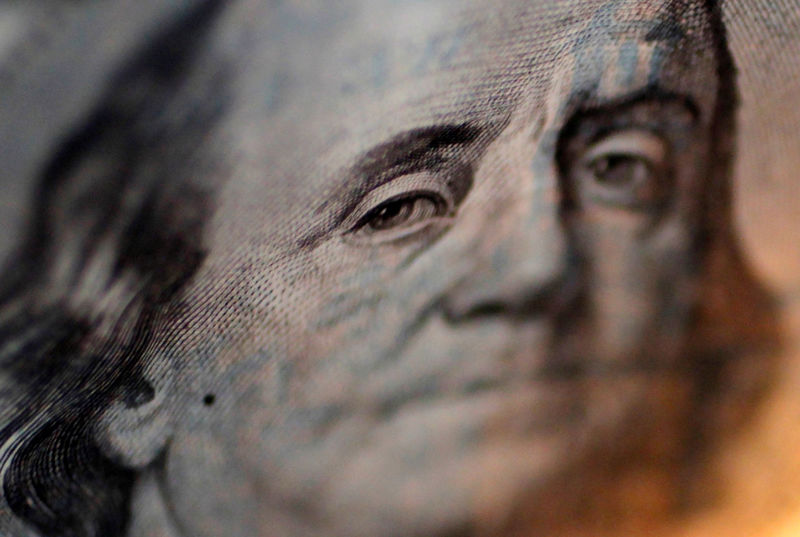(Bloomberg) -- As the coronavirus economic fallout accelerates around the globe, some experts say the U.S. dollar’s ups and downs are the best way to divine whether market mayhem is easing.
Wall Street pros have a huge arsenal of funny-sounding indexes like the VIX and FRA-OIS they can use to gauge how risky and stressed financial markets are. But something far more straightforward yet vital -- the U.S. currency -- looks like an ideal benchmark in this moment. A mixture of panic and actual liquidity shortages have corporations, central banks and investors around the world amassing dollars, making it like an MRI scoping beneath the surface of markets to show exactly how bad things are.
The Bank for International Settlements, an authority on the global financial system given its role as the central bank for central banks, has concluded the greenback is a key indicator for banking risk. During the worst moments of last month’s global liquidity crunch, the dollar surged as all manner of institutions rushed to obtain funding. The Bloomberg Dollar Spot Index advanced 10 straight days through March 23 as strains grew.
When the Federal Reserve introduced new liquidity measures to supply needed dollars, the currency lost momentum and slid. But the Bloomberg index rose again last week on Thursday and Friday after reports showed a record surge in Americans seeking jobless benefits and the U.S. unemployment rate spiked. On Monday, it’s down amid optimism coronavirus deaths might be slowing in some hotspots.
“When markets become disorderly and there’s a mad scramble for dollar financing, then the dollar is a better measure than typical safe-haven currencies” in assessing systemic stress, David Loevinger, a former China specialist at the U.S. Treasury and now an analyst at fund manager TCW Group Inc. in Los Angeles, said in an email. Even the yen and franc -- the typical refuges -- lagged the greenback last month “during the period of max market distress,” he added.
Granted, no one says the dollar is the only useful barometer. Traders are keyed into a worrisome surge in cross-currency basis swaps, a more-than-20% plunge in the S&P 500 and carnage in junk bonds to sort out whether the worst has passed. But as the world’s primary reserve currency, the dollar stands out.
Much of the globe’s business is conducted in the greenback, while commodities, including gold, are also priced in the U.S. currency. When the liquidity crunch intensified last month, stressed international investors mopped up safer dollar-denominated assets that could be used as collateral, while they sold a variety of other assets.
That sent dollar funding costs surging to record levels, and leading to that 10-day rally in the Bloomberg dollar index, the longest winning streak since 2012. The index is still up almost 7% in 2020.
‘Best Barometer’
A drop in the dollar will signal a more positive economic outlook, said Michael Hartnett, chief investment strategist at Bank of America Corp (NYSE:BAC). When Intercontinental Exchange Inc.’s U.S. Dollar Index falls below 96, that will suggest the troubles may have passed, he said.
The gauge, which he says is the “best barometer” to track the pandemic’s toll on markets, is just over 100 now, up from a 2020 low of 94.65 on March 9.
A weaker dollar will “lead” the shift from the current deflation consensus to stagflation, a state where the economy will reflect weak growth and higher inflation, Hartnett said.
Investors who breathed a sigh of relief after the Fed’s actions eased funding strains are now agonizing over a pending global recession. Goldman Sachs Group Inc (NYSE:GS). estimates the U.S. could contract at an annualized rate of 34% in the second quarter. Germany expects its economy will shrink more than it did during the 2008 financial crisis, while China faces a blow to its industries as major customers in Europe and the U.S. are impaired -- all helping drive investors into the greenback.
“Since this economic and financial crisis is at its core a health crisis, economic policy measures can only ameliorate the economic and financial consequences,” Paul Meggyesi, currency strategist at JPMorgan Chase (NYSE:JPM) & Co., wrote in a March 27 note to clients. “Markets will bottom and the dollar will top only when there is public health resolution.”
©2020 Bloomberg L.P.
